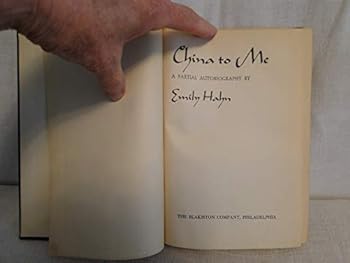China to Me: A Partial Autobiography
Select Format
Select Condition 
Book Overview
A candid, rollicking literary travelogue from a pioneering New Yorker writer, an intrepid heroine who documented China in the years before World War II. Deemed scandalous at the time of its... This description may be from another edition of this product.
Format:Hardcover
Language:English
ISBN:B0007DK6N6
Release Date:January 1944
Publisher:The Blakiston Company
Length:429 Pages
Weight:1.00 lbs.
Customer Reviews
2 ratings
Compelling memoir of wartime China
Published by Thriftbooks.com User , 15 years ago
I found this book by chance at a library booksale, and felt it was a very lucky find. It's a 1944 edition, the year it was first printed. I was so compelled by Emily Hahn's story of her stay in Shanghai and Hong Kong that I immediately became interested in this period of Chinese history, when the Japanese invaded Shanghai and eventually moved south to Hong Kong. The atmosphere of the time among the local people and among the Europeans in Shanghai, the internment of foreigners in Hong Kong, and the struggle for survival there makes for riveting storytelling. There are many books that cover this period in Chinese history, some written as fiction and others not. Hahn interviewed the Soong sisters in China during this peiod and published her famous biography, The Soong Sisters. Her book, China to Me, largely inspired a recent novel set in Hong Kong, The Piano Teacher, by Janice Y.K. Lee, a Hong Kong writer.
A Modern Classic about Everyday Life in Wartime China
Published by Thriftbooks.com User , 17 years ago
China to Me opens a fascinating window into China during the most turbulent era in its modern history. Emily Hahn, a correspondent for the New Yorker, arrived in Shanghai in 1935, looking for fun, adventure, and the subject of her next book. She wound up staying in China until 1943. This autobiographical narrative of her Chinese sojourn falls into three parts: her five years in Shanghai from 1935 to 1939; a year of writing in Chungking (Chongqing) in 1940; and three years in Hong Kong from 1940 to 1943. Hahn's stayed in Shanghai the longest, although her narration of her time there constitutes the shortest portion of the book. She reveled in the comparatively free and open social atmosphere of the European concessions. She conducted a celebrated affair with a Chinese poet, Sinmay Zau (Shao Xunmei), with whom she also ran a left-wing English-language newspaper; she even became his official concubine. She also purchased a Gibbon ape whom she named "Mr. Mills" and who accompanied her to society parties. Hahn was not a political writer. Or, perhaps better, her politics were refracted through her personal relations. She visited Nanking (Nanjing) a year prior to the Nanking Massacre. She remarks in passing on the Marco Polo Bridge incident, but assumes that her readers will already know all about it. (This may not be true of contemporary readers, for whom these events have become distant history.) Hahn excelled at describing her conversations with Japanese spies, British officers' wives, and Chinese volunteers. At a time when classes, genders, and races were still socially stratified, Hahn delighted in breaking with convention. She traveled to Hong Kong and then to Chungking after receiving permission to write an authorized biography of the famous Soong sisters. Chungking had become the capital of Free China after the fall of Nanking and was under nearly constant Japanese bombardment. She spent lots of time underground in crowded cave shelters and was rendered homeless after her hotel was destroyed. Hahn still managed to meet regularly with the sisters and to finish her biography, published in 1942. The greatest part of her narrative is given over to describing her experiences before and after the fall of Hong Kong. Hahn was basically just casting about for her next assignment in Hong Kong when events overtook her. She entered into a romance with Charles Boxer, the (married) head of British intelligence, and had a daughter by him just prior to Hong Kong's fall. The Japanese invasion forced her to live hand-to-mouth under increasingly difficult and perilous circumstances. Hahn provides valuable historical insight into everyday life in Hong Kong under Japanese occupation. She avoided being sent to Stanley Internment Camp by claiming Chinese citizenship as a consequence of her concubine marriage to Zau. Hahn nursed a wounded Boxer back to health and later provided food for him and other interned soldiers at Stanley Camp. She finally left Hong Kong






